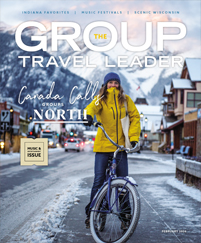The world is changing. And I suspect travel is going to change with it.
Change is a natural part of life, of course. It never really stops. But sometimes change moves more quickly than others. Movements in culture, society or technology send tremors through every element of life.
As we sit a quarter of the way through the 21st century, I can’t help but feel the pace of social change quickening. Some of the changes taking place in the world around us will present significant challenges for the tourism profession, while others bring big opportunities.
Here are four big changes I’m tracking that could impact your travel organization.
But first, we're The Group Travel Leader, America's leading experts on all things group travel. Check out our Start Here page to find free resources for building a thriving group travel program.
Now, back to the article.
Social Media Skepticism
If there’s a general headline from the first part of the 2000s, it’s that social media reshaped the world as we know it. But, recently, a growing chorus of experts and amateurs alike is questioning whether the benefits of social media are worth the costs. As Americans become weary of political polarization, negative self-image, social isolation and the many side effects of mindless scrolling, an increasing number of people (myself included) are choosing to sign off social media for good. If you have built your travel brand on a social app, it may be worth thinking about whether that platform will remain stable in the long term.
Sober Curiosity
When I first started attending tourism industry events in the early 2000s, I was struck by how large a role alcohol played. It seemed everyone was drinking all the time. Today, though, that tide is turning. A significant number of travelers and tourism professionals are embracing — or at least exploring — alcohol-free living. Entrepreneurs are launching tour companies that cater to non-alcoholic travelers who abstain for a mix of reasons, including addiction recovery, health concerns and religious convictions. And the ranks of non-drinkers, especially among Gen Z, seem to be growing. If happy hour has always factored prominently in your tour itineraries, it may be time to rethink that activity or find some alcohol-free alternatives.
AI Disruption
The drumbeat of news just doesn’t stop — in the past three years, artificial intelligence has advanced at an incredible rate, giving travelers and travel planners alike new research and booking tools that were unthinkable a generation ago. Artificial intelligence has already changed the way people find information online, and it will likely soon change the way they research — and even book — travel. If that happens, many travel professionals will face the challenge of optimizing their online presence in a way that makes it easy for AI agents to buy from them. And many others may find success in moving in the opposite direction, intentionally leaning into the humanity of their experiences to serve an audience tired of machine outputs.
Social Isolation
Study after study in the 2020s has found that social isolation is at record high levels throughout the developed world. And it’s worst among younger people, who crave meaningful relationships but feel ill equipped to build them. This “loneliness epidemic” is a real problem for society. It’s also a real opportunity for our industry. Traveling with a group of people is one of the best ways to build friendships fast. In fact, there’s a whole ecosystem of travel entrepreneurs starting new tour companies with the express purpose of helping younger people build friendships by exploring the world together. Whatever role you play in the travel industry, you’re part of the solution to a serious problem. And that’s a change to celebrate.












